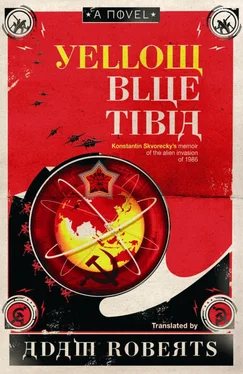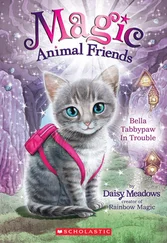Adam Roberts
YELLOW BLUE TIBIA
A novel
‘You are right. I understood this myself when I read your novel The Time Machine. All Human conceptions are on the scale of our planet. They are based on the pretension that the technical potential, though it will develop, will never exceed the terrestrial limit. If we succeed in establishing interplanetary communications, all our philosophies, moral and social views, will have to be revised. In this case the technical potential, become limitless, will impose the end of the role of violence as a means and method of progress.’
Vladimir Ilych Lenin, in conversation with H. G. Wells
PART ONE

‘We have internal enemies. We have external enemies. This, comrades, must not be forgotten for a single moment.’
Stalin in 1928
‘The war will soon be over. We shall recover in fifteen or twenty years. Then we’ll have another go at it.’
Stalin in 1945
CHAPTER 1

1
At dawn we boarded a special train. The track had recently been repaired. We all commented on the extraordinary and heroic efficiency with which war damage was being repaired all the way across the city. Sergei declared that the sunrise resembled a frozen explosion: clouds strewn about the sky like shreds of raw meat, and a vivid orange-yellow billowing-up of colour behind the eastern horizon. Our military escort didn’t know what to make of this. It’s possible they suspected bourgeois decadence in such talk. It’s possible they were right to be suspicious. Certainly the sky contrasted very sharply with the iron and stone of the city: grey and silver and rust. The eye was inevitably drawn to the frozen rage of sunrise. Such colours. We were on our way to meet Comrade Stalin himself, in person, and all of us feeling almost as honoured and excited as we did terrified. Then Sergei, as perverse as ever, tried to get the whole carriage singing patriotic songs, but the soldiers didn’t join in.
A smashed motorcycle was lodged in the fork of one bare tree.
An indication that this trip was something special came when one of the soldiers distributed American cigarettes. American cigarettes! We all smoked. The air inside the carriage, which had had the night chill still in it, began to warm and blur. The soldiers loosened their manner, became chatty.
‘They weren’t so badly touched here,’ said one of them, waving his hand at the window. ‘They complain, but compare this with the rest of the Motherland! Compare this with the west .’ He made a pssshh noise with his lips. ‘Hardly any damage, here.’
‘They should see the Volga,’ said another. ‘I’m not only talking about Stalingrad, but the whole countryside round there.’
‘I fought at Stalingrad,’ said Sergei Pavlovich Rapoport.
That killed the conversation.
We arrived at a small station in the middle of farmland. As we disembarked, Sergei said, ‘And where will our next train take us?’ He said no more, but his meaning — that he was expecting us all to be shipped off to the Gulag — was clear enough. The soldiers escorting us decided to find this hilarious — fortunately for us.
Our further transport took the form of three mule carts. Adam Kaganovich, giddy (I suppose) with the fear and the excitement, pretended to take offence at this. ‘Carts! Donkeys! You cannot expect us to put up with such rusticity, comrades! Comrades, remember that we are science fiction writers!’ ‘That you are science fiction writers,’ said the Lieutenant, in charge of us, ‘is precisely why Comrade Stalin wishes to see you.’
2
When we arrived at the dacha everything happened very quickly. We were taken through into a large room, with tall windows of uncracked glass and excellent views across the low hills. The ungrazed grasses, high and feathery, fuzzed the distant fields. One flank of the landscape was a blue-green, almost the colour of sky.
The room was under-furnished: a few chairs, nothing more. Over the mantelpiece was a large photographic reproduction of a group of revolutionary heroes. I recognised Molotov, Mikoyan, Kalinin and Comrade Stalin himself. In the middle was Lenin, with that expression on his face you often see in photographs of him — that sly narrowing of the eyes, his tight little beard bunched up around his upturned mouth, as if he is richly enjoying a joke that he has not chosen to share with anybody else.
A samovar was brought in and we all drank tea, smoking nervously the whole time. And then, without preliminary or preparation, in came Stalin himself , in the flesh, flanked by two aides. We all stood, of course, straight as iron railings, all in a line; and he came over and greeted us one by one, shaking our hands, and looking each of us in the eye. It was immediately evident that he knew our writings, that — indeed! — he was an enthusiast for science fiction. When he got to him, Frenkel dipped his head and said, ‘Ivan Frenkel, comrade.’
‘Ivan,’ said Stalin. ‘Ivan Frenkel. Not — Jan ?’ And he laughed. Frenkel, a Slav, had been born Jan, of course, but had been publishing under the name Ivan since the thirties. ‘It’s more patriotic,’ he had once explained to me. ‘It’s a more patriotic name.’ But what did Comrade Stalin mean by drawing attention to Jan ? The expression on Frenkel’s face was ghastly — smiling, but ghastly. Was Stalin saying: Do not pretend to be Russian when we all know you to be a Slav ? He did not explain. He moved along the line with a jovial expression.
You will want me to say what my impression of him was. I can do little better than say to you that what most struck me, meeting him in the flesh, was how very like himself he looked. It is a foolish observation, I daresay, but that’s what most struck me. You must remember that his image was ubiquitous in the Soviet Union at that time: and the strong features, the thick black hair and moustache, the sheer physical heft and presence of the man, were exactly as you would think they were. It is true that he looked old: but, after all, he was in his late sixties. There was a degree of pallor and slackness to his complexion. Little red broken veins embroidered the corners of his nose. His eyes were each surrounded by an oval of puffy flesh. But his gaze was unwavering. I had heard it said that when encountering Stalin the crucial thing was to meet his gaze . Any shiftiness about the eyes, any apparent avoidance of looking directly back at his gaze, could provoke mistrust, rage or worse. Only a few things about the physical proximity of Stalin surprised me. One was his height — for he was considerably shorter than I had expected. The other was his smell. A tart odour combined of tobacco and sweat. Also (this, I do not think, has been reported) his feet were very large in proportion to the rest of his body. I could see this as he moved along the line.
He shook hands with Sergei Rapoport, Adam Kaganovich, Nikolai Asterinov and myself, one after the other. When he met Asterinov he chortled. Visibly plucking up his courage, Asterinov said, ‘Funny, comrade?’
‘Oh, Nikolai Nikolaivitch,’ Stalin said. ‘I am only thinking that they were making a film of your Starsearch , and I ordered the production stopped! And yet I admire the novel very much!’
‘Thank you, comrade,’ said Nikolai Nikolaivitch, his voice pitched rather higher than was normal for it.
Читать дальше













